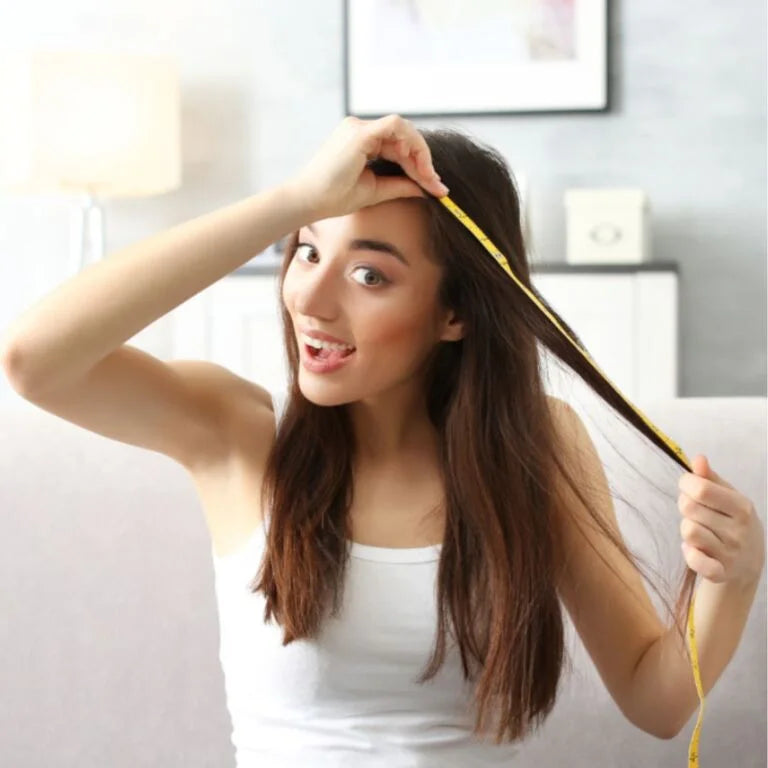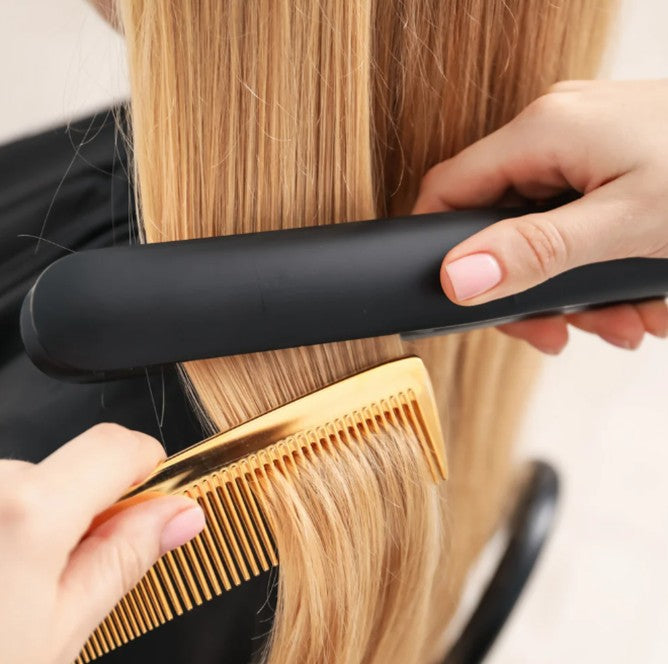Tackle Hair Breakage With Hair Extensions
by ABBEY WILSON / NOV 4, 2022

Reading Time: 6 Minutes
Index
Hair breakage and damage can be incredibly frustrating, especially since the most common area to find broken and damaged hair also happens to be the most visible: around the face and on the sides. This can be difficult to fix if you’re not sure what’s causing it in the first place. In today’s blog, we're diving into fixing damaged hair, explaining how and why breakage happens most around the face, offering tips for preventing hair damage, and sharing styling tips for damaged hair to help you hide it with some simple tricks.
For more detailed tips and our recommended hair repair products, check out our comprehensive hair care guide: Guide To Taking Care of Hair Extensions.
What Causes Hair Breakage?
Hair breakage is caused by multiple factors. The main causes are heat, over-processing, the use of incorrect accessories, and bad care. Some factors, like colouring and heat styling, are harder to avoid as they have become a staple part of our hair routine. However, there are steps that can be taken to reduce the amount of damage they cause. Breakage can be prevented with good care and a few clever accessory and tool swaps that you may already have in your cupboard!
How To Stop Hair Breakage?
In short, the stronger and healthier your hair is, the less likely it is to break. Keeping to a good hair care regime is vital to keep your hair in good condition. Healthy hair doesn’t only feel better, it takes the colour better, fades much less and styles easier. Read on to discover our tips to keep your hair healthy and prevent breakage.
- Over-processing the hair will weaken it over time causing it to eventually snap. Over-processing includes bleaching, dying, perming and any other chemical added to the hair on a regular basis. To tackle this, avoid colouring the hair too often especially if you lighten your hair. Applying dye and lighteners on top of the previous colour weakens the hair, try to only cover the section that’s grown out. You can also ask your stylist to add Olaplex No.1 Bond Multiplier into your colour to reduce the amount of breakage that bleach can cause. This will come at an extra cost but is well worth it to protect your hair.
- Using heated tools on the hair is another cause of breakage around the face and crown, especially straighteners. The hair around the front tends to be thinner and weaker so we always advise reducing the temperature in this section. Always use heat protection before using heat on your hair, this will form a protective layer on the hair shaft reducing the damage.
- Hair bands are secret assassins when it comes to broken hair around your face and crown. This is one cause of breakage that many people aren't actually aware of and it's totally avoidable. Very tight, elastic material hairbands put way too much pressure on the hair causing it to break off. As the hair at the front side is the part that touches the hairband when it's pulled back and put up it receives the full brunt of the friction. To avoid this, swap your tight elastic or tough material hair ties for soft, satin scrunchies where possible. They apply far less pressure on the hair and still look super cute. These are also the ideal hair band for use on hair extensions.
- Tight hairstyles can also put a lot of pressure on the weaker sections of the front of your hair. Super tight ponytails and half-up, half-down styles look fab but where possible try to swap for looser, softer styles. Claw clips are the height of fashion right now thanks to the Y2K craze and cause absolutely zero breakage, use them as an alternative to hairbands for half-up looks. Check out our expert blog that shows you exactly how to use one here.
@cliphairextensions AUTUMN CLAW CLIP HAIRSTYLE 🍂 #redhead #autumnhair #autumnhaircolor #hairinspo #hairstyle #hairextensions #clipinhairextensions #ginger #gingerhair ♬ Lazy Sunday - Official Sound Studio
- Strengthening your hair will also prevent damage and breakage around your face. Use a restorative hair mask on your hair at least once a fortnight to repair brittle cuticles and improve elasticity. This will not only add a protective layer to your strands it will penetrate deeper into the hair's structure to rebuild broken, brittle bonds. Our favourite is Kerastase Resistance Masque Extentioniste Hair Mask, add to the mid-lengths and ends of your hair and leave it on for 30-60 minutes for it to work its magic.
How To Hide Hair Breakage In Front Of Hair?
If you’ve found yourself with some broken hair around the front of your face, you may be finding it hard to achieve your favourite styles. Although it’s most important to follow the steps above to repair your breakage, you may need a faster solution to hide your breakage in between. You can use lightweight, discreet extensions on the sides to fill out those gaps where your hair has broken. The best hair extensions to use for this are listed below:
- Nano Hair Extensions – Nanos are tiny, individual strands of hair attached with a minuscule Nano Bead for several weeks at a time. They are ideal for filling out thin areas around the face as they can be placed super close to the hairline thanks to them being almost undetectable.
- Tape Hair Extensions – Tapes are a faster, cheaper permanent alternative to Nanos for thin areas of the hair. They are attached to the hair by sandwiching a slice of natural hair in between 2 sticky tabs. The medical-grade adhesive used on the Tapes is very secure but gentle and easy to remove.
- Seamless Full Head – For a more temporary solution you can use Clip-In hair extensions. Our Seamless Full Head has super thin, flexible seams which lay totally flat to the head. You can use the small sections of this set to fill out thinner areas around the face for occasions or whenever you need them.
@cliphairextensions Mixing shades 🙌🖤 Create a custom blend with our Tape in extensions ⚡️ #hairextensions #humanhair #extensions #hairtransformation #brunette #hairgoals ♬ LONG WAY TO GO X PROMISCUOUS - ALTÉGO
Can Hair Breakage Be Repaired?
Yes! By using the right restorative hair products and protecting your broken areas, you can totally repair your breakage. You may need to make a few changes to your usual styling routine but there are many gentle alternatives to most hair tools you can experiment with.
Best Products To Prevent Hair Breakage?
We’ve listed below our favourite products to prevent breakage in the hair.
- Heat Protection Spray – we’ve chosen our own Heat Protect Spray as it has a beautiful scent and lightweight finish and is suitable for hair extensions. Spray on the hair before styling to prevent breakage in the hair.
- Olaplex No.3 Hair perfector - This product will not only repair broken hair but also strengthen it to prevent it from further damage. This pre-shampoo treatment penetrates deep into the hair shaft to rebuild broken bonds.
Does Braiding Hair Prevent Breakage Around The Face?
Braiding the hair is a gentle alternative to using heated tools in order to achieve curls and waves. It also keeps the hair secure whilst sleeping and working out, which prevents knotting that can lead to breakage.
If you follow the advice in today's blog, you will be well on your way to repairing the broken and damaged hair around the front and sides of your face and preventing it from happening in the future. If you suffer from breakage on your hairline, check out our expert blog “Why is my hairline breaking off”.
Conclusion
In conclusion, managing hair breakage around the face can be effectively achieved with the right strategies and products. Using hair extensions for breakage not only provides a quick and stylish fix but also protects your natural hair as it recovers. By incorporating these hair care tips into your routine, you can prevent hair breakage and enjoy healthier, stronger hair. Styling hair extensions offers versatility and confidence, allowing you to create beautiful looks while nurturing your natural locks.
Ready to tackle hair breakage around your face? Discover our clip-in hair extensions for a natural and protective solution! Explore Cliphair's range of hair extensions and products today!
FAQs
How can I prevent hair breakage around my face with hair extensions?
To prevent hair breakage around your face when using hair extensions, it's crucial to take several precautions. Firstly, have your extensions installed by a professional to minimise tension on your natural hair. Opt for high-quality, lightweight extensions that reduce strain. Avoid tight hairstyles that pull on both the extensions and your natural hair. Use a silk or satin pillowcase to decrease friction while sleeping. Regularly moisturise and condition both your natural hair and extensions to keep them healthy and less prone to breakage. Additionally, minimise heat styling and chemical treatments.
What causes hair breakage near the face when using hair extensions?
Hair breakage near the face when using extensions can stem from various factors. These include improper installation techniques that apply excessive tension, heavy extensions that strain natural hair, tight hairstyles causing stress on the hairline, inadequate maintenance like insufficient conditioning, excessive heat styling or chemical treatments weakening the hair, and sleeping on rough fabrics leading to friction and breakage.
Which types of hair extensions are best for avoiding breakage around the face?
For avoiding breakage around the face, opt for certain types of extensions. Tape-in extensions distribute weight evenly and are lightweight, reducing stress on the hairline. Nano Ring extensions use small beads without glue or heat, minimising damage. Clip-in extensions, which can be easily removed, lessen constant stress on the hair.
When should I adjust my hair extensions to reduce breakage around the face?
Adjust your hair extensions regularly to reduce breakage around the face. For permanent extensions, aim for adjustments every 6-8 weeks to prevent tangling as your natural hair grows. Make adjustments if you feel discomfort, notice signs of breakage, or if the extensions feel too tight or have shifted and are pulling on your natural hair. Promptly address any damage or excessive shedding near the face to prevent further breakage.
Looking for flawless, salon-worthy hair without breaking the bank? At Cliphair, we’ve got you covered with luxurious clip in hair extensions for quick transformations and permanent hair extensions for long-lasting glam. Extensions require special care and maintenance to preserve their quality, which is why we have all the top-notch hydrating haircare products needed to keep your style on point.
Need the perfect shade? Browse our full range of human hair extensions in over 70 rich, silky shades or check out our FREE Express Color Match Service to ensure a seamless blend every time.






